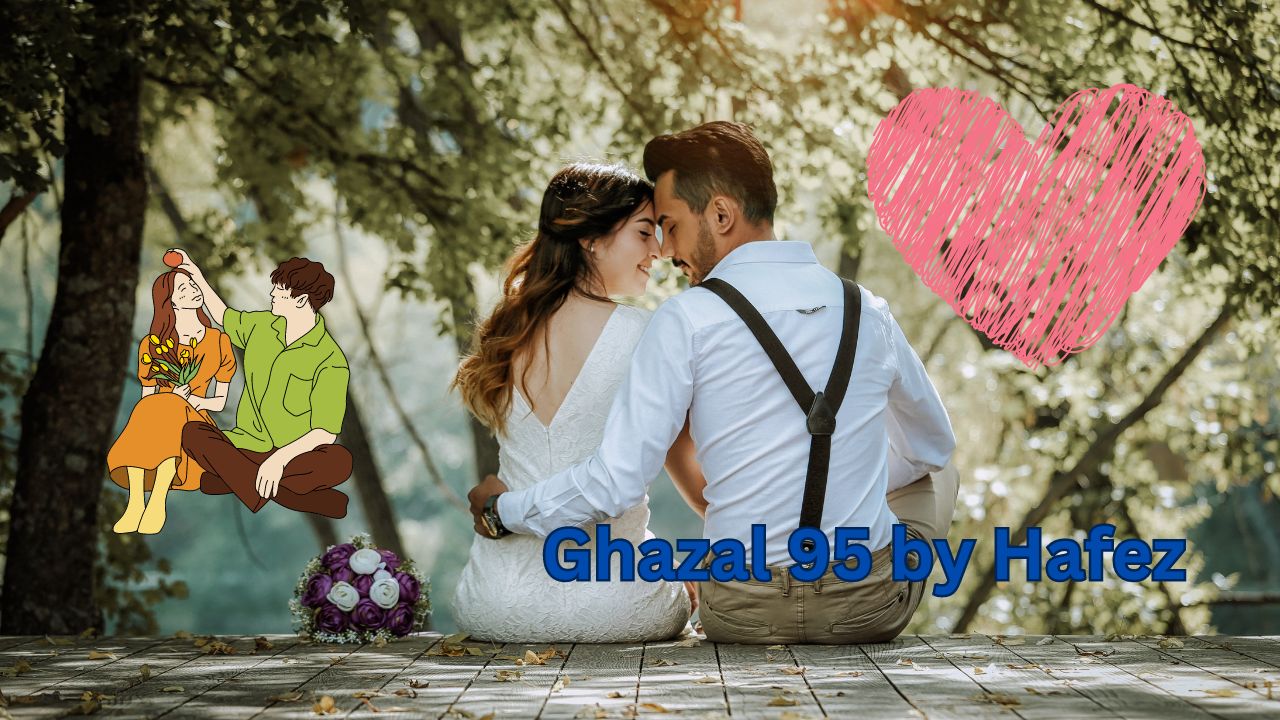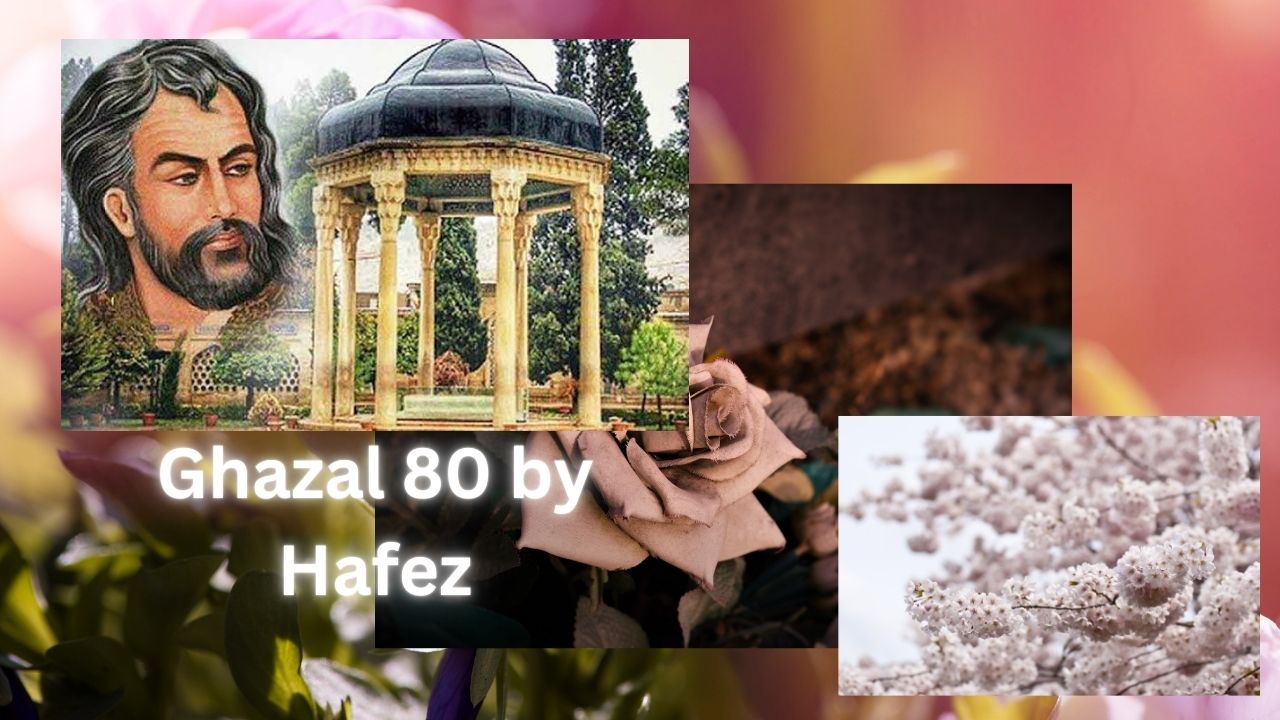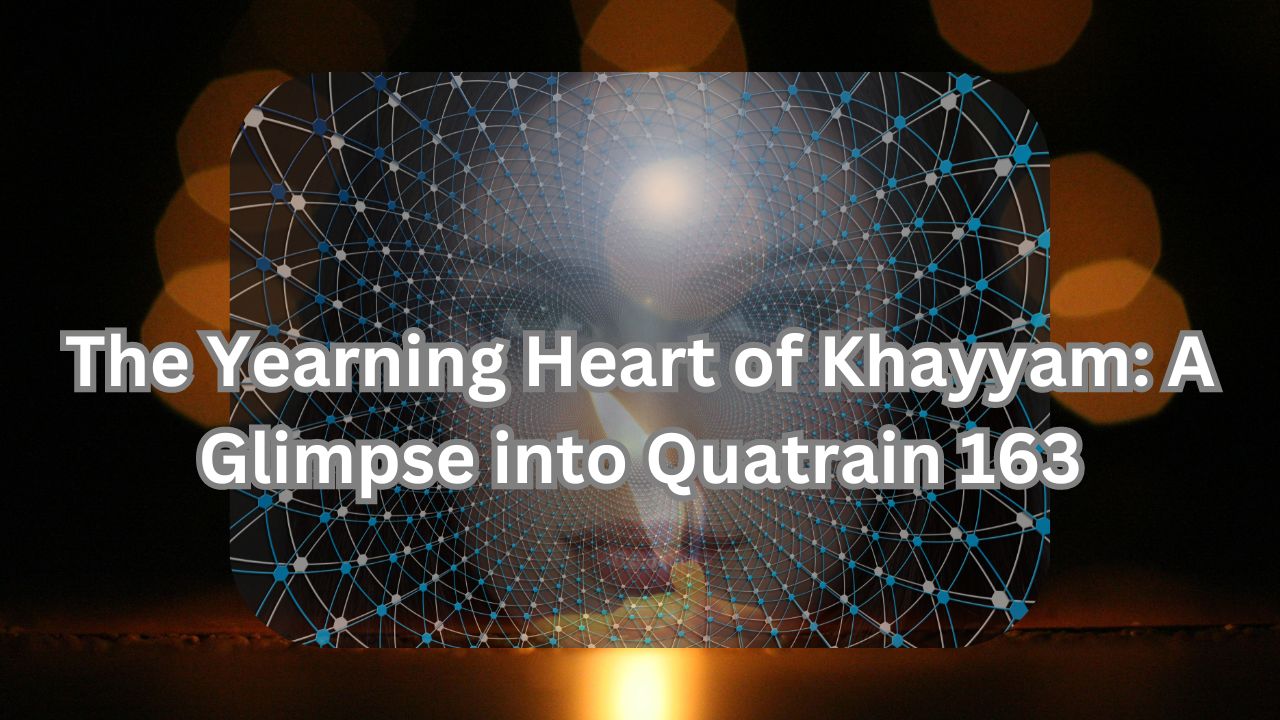Hafez’s Ghazal 95 is a captivating exploration of intoxicating love. The opening line, "The breeze of your curly locks keeps me perpetually intoxicated," immediately immerses the reader in a world of sensual and ethereal longing. This powerful image sets the stage for a poem that goes deep into the complexities of desire, obsession, and spiritual yearning.
مدامم مست میدارد نسیمِ جَعدِ گیسویت
خرابم میکند هر دَم، فریبِ چشمِ جادویت
The breeze of your curly locks keeps me perpetually intoxicated,
The deceit of your magical eyes ruins me every moment.
Always (constantly مدامم): Here, "always" also carries the connotation of "wine," as a metaphor for intoxication.
Breeze(نسیم): A delightful scent
Curls(جعد): Curled and wavy hair
Ruined(خراب): A state of devastation and restlessness, here referring to the hangover one gets from not drinking wine. The skilled poet Hafez is intoxicated by the scent of his beloved's curls in the first line, but in the second line, he is lovesick and restless due to the enchantment of her eyes. The concepts of "intoxication" and "ruination" create a Hafez-like contrast in this couplet. This contrast, a favorite of Hafez, is often used in his poetry to beautifully portray the contradictions of love.
Allure(فریب): Coquettish movements, flirtations
Your magical eyes(چشم جادویت): Your enchanting eyes. This is addressed to a worldly beloved.
Meaning of the Couplet:
O my beloved, I am in a state of contradictory ecstasy. On the one hand, the delightful scent that wafts from your curled locks intoxicates me, while on the other hand, I am lovesick and restless due to the enchantment of your magical eyes.
Explanation of Poetic Devices:
-
Contrast: The juxtaposition of "intoxication" and "ruination" creates a powerful contrast that captures the complexities of love and desire.
-
Metaphor: The use of "wine" to symbolize intoxication is a common poetic device.
-
Imagery: The vivid imagery of the beloved's scent and eyes helps to create a sensory experience for the reader.
Overall, this couplet is a beautiful example of Hafez's poetic skill. It explores the complex emotions of love and desire through the use of vivid imagery and contrasting ideas.
***
پس از چندین شکیبایی شبی یا رب توان دیدن
که شمعِ دیده افروزیم در محرابِ ابرویت
After so much patience, O Lord, may I be able to see one night
When the candle of my sight shines in the prayer niche of your eyebrows.
The eye is likened to an extinguished candle that is destined to be lit by the light of the beloved's eye in the 'mihrab' (niche) of her eyebrows.
Lighting a candle in a 'mihrab' evokes the spiritual atmosphere of prayer and supplication.
The beloved's charming arched eyebrow is likened to a 'mihrab,' a place of prayer and supplication.
For a lover like Hafez, the beloved's arched eyebrow is the most sacred 'mihrab' for prayer and to light the candle of the eyes (to illuminate the eyes) with the light of the beloved's eyes.
Meaning of the couplet: After all this unbearable patience, O God, will we find the opportunity one night to light the candle of our eyes in the sacred 'mihrab' of her eyebrows, gazing into the beloved's eyes?
Explanation of Poetic Devices and Nuances:
-
Metaphor: The eye is compared to an extinguished candle, symbolizing the longing and desire of the lover. The beloved's eyebrow is likened to a 'mihrab,' a niche in a mosque where the imam leads prayers, emphasizing the spiritual significance of the beloved.
-
Imagery: The vivid imagery of the candle and the 'mihrab' creates a powerful visual and emotional impact. The act of lighting the candle symbolizes the fulfillment of the lover's desire.
-
Symbolism: The 'mihrab' represents a sacred space for spiritual connection and communion. By comparing the beloved's eyebrow to a 'mihrab,' Hafez suggests that the act of gazing into the beloved's eyes is a deeply spiritual experience.
-
Sufism: The poem carries Sufi undertones, as the lover's longing for union with the beloved mirrors the Sufi's quest for divine union.
Overall, this couplet is a beautiful and evocative expression of love and longing. Hafez uses rich imagery and symbolism to create a powerful and moving portrait of the lover's spiritual journey.
***
سوادِ لوح بینش را عزیز از بهر آن دارم
که جان را نسخهای باشد ز لوحِ خالِ هندویت
I cherish the darkness of the tablet of my perception
Because it may have a prescription for my soul from the tablet of your Indian mole.
سواد has many meanings, but here, given its placement next to "صفحه ی بینش" (page of vision), it refers to the blackness in the center of the eye (pupil), which is considered the most precious part of the body due to its significance and magical power. In Turkish culture, when someone is deeply loved, they say "قاراگِلَه" which means "my black eye" or "you are as precious to me as the blackness of my eye." (قارا: black, گِلَه: pupil) However, Hafez says that the blackness of the eye is dear to him not because of its power of sight, but because it reminds him of the shape of your black mole, as if a copy of your mole is imprinted on my soul.*
سواد لوح بینش: The blackness of the pupil.
خال هندو: Refers to black, attractive, and mysterious moles.
Meaning of the couplet: I cherish the pupil and blackness of my eyes because they remind me of the image of your enchanting mole. I imagine that a copy of your magical mole is imprinted within my soul and mind.
Explanation of Poetic Devices and Nuances:
-
Metaphor: The eye is compared to a canvas, and the pupil is likened to a black mole, symbolizing the deep connection between the lover and the beloved.
-
Symbolism: The black mole represents a unique and captivating feature of the beloved, and its imprint on the lover's soul signifies a deep emotional connection.
-
Imagery: The vivid imagery of the black mole being imprinted on the lover's soul creates a powerful visual and emotional impact.
-
Sufism: The poem carries Sufi undertones, as the lover's intense focus on a physical feature of the beloved can be seen as a symbol of the spiritual journey towards divine union.
Overall, this couplet is a beautiful and evocative expression of love and longing. Hafez uses rich imagery and symbolism to convey the depth of his love for his beloved, emphasizing the spiritual significance of their connection.
***
تو گر خواهی که جاویدان جهان یکسر بیارایی
صبا را گو که بردارد زمانی بُرقِع از رویت
If you wish to adorn the world forever,
Tell the morning breeze to remove your veil for a while.
Burqa: A veil, a face cover, a cloth that is still worn by girls and women in some parts of Iran.
Meaning of the couplet: If you want to transform the entire world into a place of prosperity, improvement, and beauty, it is enough to beckon to the gentle breeze to unravel your veil and let the radiance of your face illuminate the world, turning it into a joyful garden.
Breakdown of the couplet:
The poet suggests that the beloved's beauty has the power to transform the entire world. By simply revealing her face, she can bring about a global transformation, turning the world into a beautiful and joyful place.
-
Beckoning to the breeze: This is a poetic way of saying that the beloved should remove her veil. The breeze is often used as a symbol of change and renewal in Persian poetry.
-
Unraveling the veil: This refers to the act of removing the veil, which symbolizes the revelation of the beloved's beauty.
-
Radiance of the face: The beloved's face is described as a source of light and beauty that can illuminate the entire world.
-
Joyful garden: This is a metaphor for a perfect and beautiful world.
Overall, the couplet is a powerful expression of the beloved's beauty and the transformative power of love.
***
و گر رسمِ فنا خواهی که از عالم براندازی
برافشان تا فروریزد هزاران جان ز هر مویت
And if you wish to destroy the order of mortality from the world,
Let your hair fall so that thousands of lives may fall from each strand.
Barafshan: Unloose your hair and entrust it to the breeze.
Meaning of the couplet: Continuing from the previous couplet, if you wish to abolish the custom of mortality and death, it is enough to let your hair flow freely and entrust it to the gentle breeze. In this way, the souls that are captive to your locks and are on the brink of death will be freed and will receive new life, an immortal life, from the revelation of your beauty.
Breakdown of the couplet:
The poet is suggesting that the beloved's beauty has the power to conquer death and grant eternal life. By simply letting her hair down, she can free the souls of those who are captivated by her beauty and give them new life.
-
Unloose your hair: This is a symbolic act that represents the revelation of the beloved's beauty and her power to transform the world.
-
Entrusting it to the breeze: This is a poetic way of saying that the beloved's hair should be allowed to flow freely, spreading its beauty and enchantment.
-
Souls captive to your locks: This refers to the people who are deeply in love with the beloved and whose lives are intertwined with her.
-
Eternal life: By revealing her beauty, the beloved can grant eternal life to those who are captivated by her, suggesting that her beauty is a source of spiritual renewal.
Overall, the couplet is a powerful and mystical expression of the beloved's beauty and her ability to transcend the limits of mortality.
***
من و بادِ صبا مِسکین دو سرگردانِ بیحاصل
من از افسونِ چشمت مست و او از بویِ گیسویت
I and the morning breeze, two poor wanderers without fruit,
I am intoxicated by the magic of your eyes, and he by the scent of your hair.
Afsoon: Enchantment, magic
Meaning of the couplet: O beloved, both I and the gentle breeze are equally wretched, lost, and bewildered in our love for you, and we run in every direction out of longing for you. The breeze is intoxicated by the delightful scent of your curls, and I am intoxicated by the magic of your eyes. Hafez, the eloquent poet, in another place, shares his lover's feelings and emotions with a gazelle.
Breakdown of the couplet:
The poet compares his state of love to that of the gentle breeze. Both are captivated by the beloved and are driven by an intense longing for her.
-
Afsoon: The use of "afsoon" (enchantment) emphasizes the magical and irresistible power of the beloved's eyes.
-
Comparison to the breeze: The poet compares himself to the breeze, suggesting that his love is as gentle and pervasive as the wind.
-
Shared emotions: The poet shares his feelings of longing and bewilderment with the breeze, creating a sense of unity between himself and nature.
Overall, the couplet is a beautiful and evocative expression of love and longing. Hafez uses vivid imagery and poetic devices to create a sense of shared experience between the lover, the beloved, and nature.
Additional Notes:
-
The reference to the gazelle in the last sentence is a common motif in Persian poetry, where animals are often used as symbols for human emotions.
-
The poet's use of sensory imagery, such as the "delightful scent of your curls" and the "magic of your eyes," creates a vivid and immersive experience for the reader.





